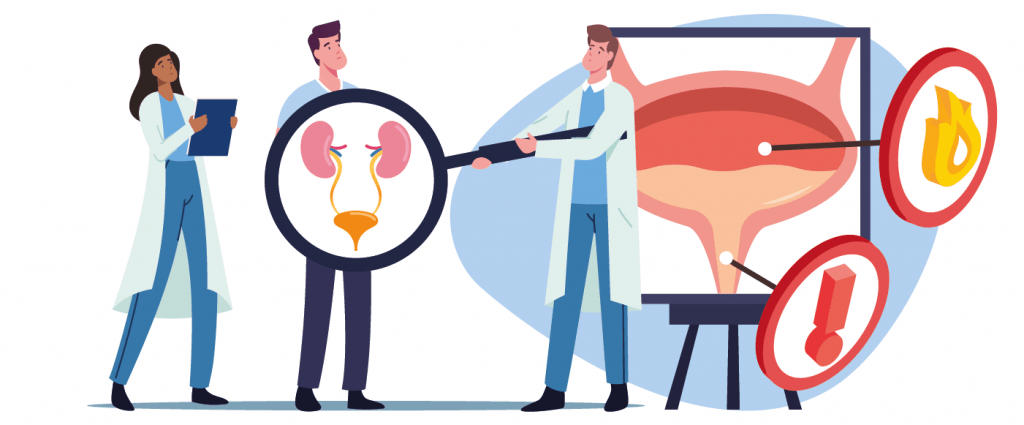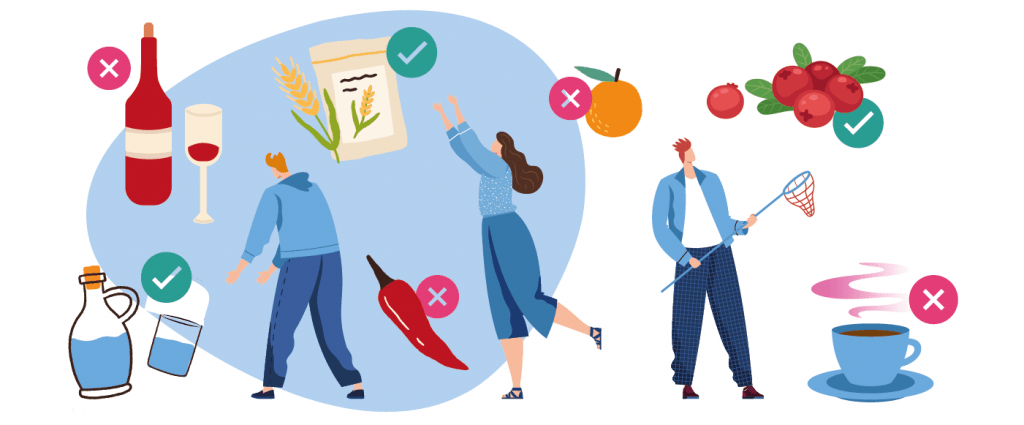5 foods to prevent bladder inflammation (and 5 foods to avoid!)
Bladder inflammation, also known as cystitis, can be uncomfortable, even though it’s normally nothing to worry about. If you’re experiencing discomfort due to bladder inflammation, there are natural remediesyou can try at home to improve your symptoms. We’ve gathered information on the best food and drinks to lessen bladder inflammation and some food and drink you might wish to avoid.

What is bladder inflammation?
Cystitis is the medical term for bladder inflammation. Put simply, inflammation is when a part of your body becomes irritated and swollen.1
You may be experiencing bladder inflammation if you have the following symptoms:
- pain, burning or stinging when you wee
- needing to pee more often than normal
- cloudy or strong-smelling urine
- stomach pain.2

Most cases of cystitis are mild, and you won’t need treatment from a doctor. However, if you have any of the following symptoms, we recommend you speak to your healthcare provider:
- a high fever or chills
- back or side pain
- nausea and/or vomiting.3
You should also speak to your GP if your symptoms are persistent (last longer than a few days), you are pregnant, you frequently experience bladder inflammation, or your child has cystitis.4
What causes bladder inflammation?
In most cases, bladder inflammation is caused by a urinary tract infection (or UTI)5, which occurs when bacteria enter the bladder or urethra and multiply.6 Many things can cause a UTI, including:
- not urinating when you need to and ‘holding’ it
- being dehydrated
- poor personal hygiene.7
However, cystitis can also be caused by certain lifestyle factors rather than an infection, including:
- using diaphragms and spermicides, which can alter the bacteria in the urethra8
- smoking – there are chemicals in tobacco that irritate the bladder9
- the menopause, which causes changes to hormone levels
- wearing synthetic materials and thongs10
- taking certain medications
- irritating hygiene products, such as shower gel and deodorant 11.
How to improve bladder inflammation symptoms
While a doctor may recommend antibiotics if your cystitis is caused by a urinary tract infection12, there are other at-home treatmentsyou can try. These include:
- avoiding douching, which changes the bacterial composition of the vulva
- taking showers instead of baths13
- wearing cotton underwear and loose clothes
- applying heat packs or a hot water bottle for pain
- over-the-counter pain relief, such as paracetamol and ibuprofen.14
Moreover, if you find that bladder inflammation causes you to experience leaks, you could try a comfortable and discreet continence product, such as iD Light. These pads have an anatomical design for a perfect fit and are infused with chamomile, known for its soothing properties.

5 foods to eat to prevent bladder inflammation
Additionally, you can make certain dietary changes to manage your bladder inflammation symptoms. Improve symptoms by making the following changes to your diet:
- drink unsweetened cranberry juice, which may help prevent UTIs by making it harder for infection-causing bacteria to stick to the urinary tract15
- increase your fluid intake to remain hydrated, as concentrated urine can irritate the bladder
- make your urine slightly acidic to ward off infection by taking a Vitamin C supplement or drinking barley water
- up your fibre intake with wholegrain carbohydrates (such as pasta and bread) and five portions of fruit and vegetables. This helps to prevent constipation, which can make symptoms of bladder inflammation worse16
- increase your intake of Omega 3 fatty acids because they have anti-inflammation properties17.
5 foods that worsen bladder inflammation
As well as there being foods that can improve cystitis symptoms, there are others that are believed to make them worse. If you want to manage your symptoms, try limiting your intake of the following foods and drinks:
- fruit teas containing hibiscus, as some people find these make their symptoms worse
- caffeinated drinks, such as tea, coffee and certain fizzy drinks like cola, which are also bladder irritants18
- artificial sweeteners, which may be present in diet versions of fizzy drinks
- alcohol, which is a diuretic19
- spicy foods, which can irritate the bladder20.
If you’re looking for a solution for urinary incontinence caused by bladder inflammation, why not try iD Pants? These absorbent pants are made from a breathable material with odour control – perfect for wearing both during the day and at night.

Sources
1 “What Is Cystitis?”, Healthline Editorial Team, 16 April 2019, Source: https://www.healthline.com/health/cystitis
2 “Cystitis”, NHS 24, 13 November 2020, Source: https://www.nhsinform.scot/illnesses-and-conditions/kidneys-bladder-and-prostate/cystitis
3 “Cystitis”, Mayo Clinic Staff, n.d., Source: https://www.mayoclinic.org/diseases-conditions/cystitis/symptoms-causes/syc-20371306
4 “Cystitis”, NHS 24, 13 November 2020, Source: https://www.nhsinform.scot/illnesses-and-conditions/kidneys-bladder-and-prostate/cystitis
5 “Cystitis”, Mayo Clinic Staff, n.d., Source: https://www.mayoclinic.org/diseases-conditions/cystitis/symptoms-causes/syc-20371306
6 “What Is Cystitis?”, Healthline Editorial Team, 16 April 2019, Source: https://www.healthline.com/health/cystitis
7 “Urinary Tract Infections (UTIs)”, Jenny Stamos Kovacs, 31 October 2021, Source: https://www.webmd.com/women/guide/your-guide-urinary-tract-infections
8 “Cystitis: Risk Factors and Treatment”, WebMD, 1999, Source: https://www.webmd.com/women/features/cystitis-risk-factors-treatment
9 “Bladder pain syndrome (interstitial cystitis)”, NHS, 18 February 2022, Source: https://www.nhs.uk/conditions/interstitial-cystitis/
10 “Preventative Measures”, Bladder Health UK, n.d., Source: https://bladderhealthuk.org/cystitis-utis-fowlerssyndrome/bc-treatments/preventative-measures
11 “What Is Cystitis?”, Healthline Editorial Team, 16 April 2019, Source: https://www.healthline.com/health/cystitis
12 “Urinary tract infections (UTIs)”, NHS, 18 November 2020, Source: https://www.nhs.uk/conditions/urinary-tract-infections-utis/
13 “Cystitis: Risk Factors and Treatment”, WebMD, 1999, Source: https://www.webmd.com/women/features/cystitis-risk-factors-treatment
14 “What Is Cystitis?”, Healthline Editorial Team, 16 April 2019, Source: https://www.healthline.com/health/cystitis
15 “Are Cranberries Good for UTI Prevention?”, Stephanie Watson, 18 March 2021, Source: https://www.webmd.com/a-to-z-guides/cranberries-for-uti-protection
16 “Diet And Lifestyle Changes”, Bladder & Bowel Community, n.d., Source: https://www.bladderandbowel.org/conservative-treatment/diet-and-lifestyle-changes/
17 “SUPPLEMENTS”, Interstitial Cystitis Association, 2 May 2016, Source: https://www.ichelp.org/living-with-ic/interstitial-cystitis-and-diet/supplements/
18 “Diet And Lifestyle Changes”, Bladder & Bowel Community, n.d., Source: https://www.bladderandbowel.org/conservative-treatment/diet-and-lifestyle-changes/
19 “15 Tips To Keep Your Bladder Healthy”, National Institute on Aging, 24 January 2022, Source: https://www.nia.nih.gov/health/15-tips-keep-your-bladder-healthy
20 “Cystitis”, Mayo Clinic Staff, n.d., Source: https://www.mayoclinic.org/diseases-conditions/cystitis/symptoms-causes/syc-20371306
